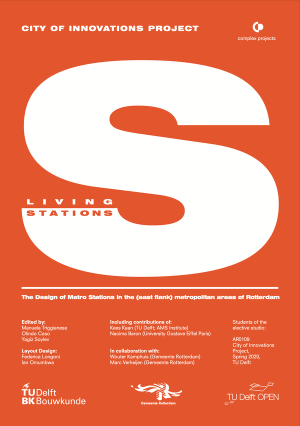Hosted by
Living Stations: The Design of Metro Stations in the (east flank) metropolitan areas of Rotterdam
Synopsis
Due to the growing demand for mobility (as a primary need for people to get to work, to obtain personal care or to go travelling), cities continue to be faced with new urban challenges. Stations represent, along mobility networks, not only transportation nodes (transfer points) but also architectural objects which connect an area to the city’s territorial plane and which have the potential to generate new urban dynamics. In the ‘compact city’ the station is simply no longer the space to access mobility networks, as informed by their dry pragmatism, but becomes an urban place of sociality and encounter - an extended public space beyond mobility itself. Which relationships and cross-fertilizations can be significant for the design of the future living stations in the Municipality of Rotterdam? How ought these stations to be conceived in order to act as public places for collective action? Which (archetypical) devices can be designed to give a shape to the ambitions for these stations? The station as a public space and catalyzer for urban interventions in the metropolitan area of Rotterdam is the focus of the research initiative presented in this publication. City of Innovations Project — Living Stations is organized around speculating and forecasting on future scenarios for the city of Rotterdam. ‘What is the future of Rotterdam with the arrival of a new metro circle line system?’ In the past fifty years, every decade of Rotterdam urban planning has seen its complementary metro strategy, with profound connections with the spatial planning and architectural themes. Considering the urban trends of densification and the new move to the city, a new complementary strategy is required. The plans to realize 50.000 new homes between the city center and the suburban residential districts in the next 20 years go together with the development of a new metro circle line consisting of 16 new stations; 6 of which will connect the new metro line to the existing network. Students of the elective City of Innovations Project (AR0109) have been asked to develop ambitious but plausible urban and architectural proposals for selected locations under the guidance of tutors from the Municipality of Rotterdam and Complex Projects. The Grand Paris Express metro project in France has inspired the course’s approach. Following the critical essays on the strategic role of the infrastructural project for city development interventions, the ‘10 Visions X 5 Locations’ chapter is a systematization of the work of 35 master’s students with input from designers of the City of Rotterdam and experts and academic from the University of Gustave Eiffel in Paris. The research-through-design process conducted in the City of Innovations project - Living Stations consists of documenting and analyzing the present urban conditions of selected station locations in the City of Rotterdam and proposing design solutions and visualizations of the predicted development of these locations.

